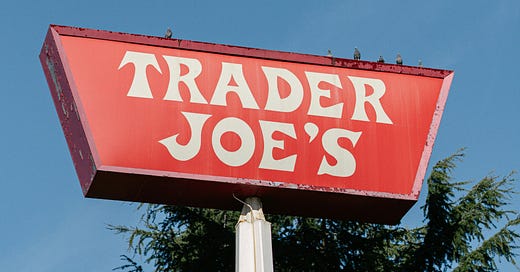Punching Above Your Weight: What Startups Can Learn from Trader Joe’s
Inspired by the “Own Your Reputation” pillar from GrowUp
Photo by Christopher Stites on Unsplash
I wouldn’t call myself a Trader Joe’s superfan, but it’s hard to ignore when everyone around you is.
My mom swears by their salads. Friends have go-to snacks they’ll defend with passion. And even if I’m not shopping there, somehow I end up talking about it — whether it’s a product hack, a seasonal drop, or the fact that the parking lot is nearly impossible to get in and out of. Seriously, why are they always wedged into the most chaotic shopping centers?
And yet, Trader Joe’s is a phenomenon. Not because it’s the biggest, or because it spends the most. But because it knows who it is, and makes you feel like you’re in on the secret.
That’s what punching above your weight looks like. And for startups? That’s the playbook.
Trader Joe’s began in 1967, long before "brand love" was a marketing term. Joe Coulombe, the founder, didn’t have a flashy logo or a big ad budget. What he did have was an instinct for people and an eye for cultural shifts. He saw an emerging customer segment — what he called the “overeducated and underpaid.” These were teachers, journalists, and academics. People who cared about quality and discovery, but didn’t have luxury budgets. He recognized them before the market did. And, instead of trying to copy traditional grocery stores, he built something entirely different for them.
Joe Coulombe was a classic Innovator, as I define in GrowUp — someone who sees patterns others miss, challenges industry norms, and builds new models when the old ones no longer serve. But he also carried the strengths of a Connector. Trader Joe’s wasn’t just a smart business — it was a brand people felt close to. From the Hawaiian shirts to the handwritten signs to the cheeky Fearless Flyer, it was clear this wasn’t just a transactional place to shop. It was a relationship.
He didn’t just build a grocery store; he built a reputation. And that’s where so many startups miss the mark.
When you’re an early-stage founder, you’re focused on product, traction, and the next fundraise. But in today’s market, reputation is strategy. It’s how you win attention before you have scale. It’s how you keep early customers when you’re still working out the kinks. And it’s how you turn scrappiness into momentum.
Trader Joe’s didn’t offer more. They offered clarity. While competitors stocked 30,000+ items, they carried around 4,000 — and made every single one count. The result? Simplicity, trust, and a sense that you were being taken care of.
They didn’t sound like a corporate chain. They sounded like someone you’d actually want to talk to. They leaned into quirks, celebrated what made them different, and stayed obsessively tuned to their audience.
It worked. And startups can do the same.
Define your villain: What’s broken in your category? What are you rebelling against? Every great story needs tension. Trader Joe’s didn’t just sell food — they challenged the entire supermarket model. Startups need to do the same. Write your manifesto. Name the thing you're here to fix. Let that shape your product, your brand, and your point of view.
Standardize delight: Delight isn’t always about swag or surprise. Sometimes, it’s about being the one partner who shows up. Answer the question no one else will. Turn around a fix in hours, not days. Offer exec-level attention when it matters most. Trader Joe’s does this through well-trained, genuinely helpful staff. Startups can do it by being dependable, responsive, and invested in their customers’ success from day one.
Talk like a human: Trader Joe’s doesn’t use grocery jargon — they sound like someone you’d actually want to hang out with. Your startup should too. Your tone of voice is a competitive asset. Ditch the acronyms. Avoid the buzzwords. If your customer wouldn’t say it, you probably shouldn’t either.
Amplify your early believers: Your best marketing might already be using your product. Trader Joe’s fans don’t just shop — they evangelize. They post hauls, write blogs, and trade product tips like they’re sharing secrets. Startups can harness that same energy. Feature your early believers. Let them shape your roadmap. Build a lightweight ambassador program. Give your champions a mic.
Pick a hill to own: Trader Joe’s didn’t try to be all things to all people. They owned simplicity, curation, and personality. What’s the hill your brand will be known for? Don’t say “great service.” Say something bolder. Build everything — product, ops, culture — around that hill.
Get your POV out there: A manifesto locked in your Notion doc won’t change anything. Publish it. Talk about it. Share it in conversations, on LinkedIn, with reporters, and in every customer interaction. Know who’s influential in your space. Get to know them personally. Influence isn’t always bought — sometimes it’s earned through presence and conviction.
Design like you mean it: You don’t need a massive ad campaign to look legit. But a strong visual identity — great product UI, a crisp deck, a compelling video — gives your startup gravity. Trader Joe’s packaging alone builds trust. Startups that invest in thoughtful design often look and feel 10x more established than they are. That’s a powerful edge.
Punching above your weight doesn’t mean faking scale. It means using your size as an advantage — being faster, sharper, and more personal than the competition. Trader Joe’s didn’t win by acting like a giant; they won by being deeply, unapologetically themselves. In a world of overbuilt, overfunded sameness, that’s what actually stands out. You may not have the biggest budget. But with clarity, conviction, and a distinct point of view, you might just build something people can’t stop talking about.
To learn more about my GrowUp framework and how it can help grow your leadership style visit: Michelledenogean.com






The phrase 'obsessively tuned to their audience' really resonates with me, as it's evident in countless small details. Their deliberate choice to exclude self-checkouts perfectly illustrates this. While many companies opt for cost-saving automation, they double down on human connection. Their cashiers don't just process transactions; they actively engage, offering personal recommendations and ensuring every customer leaves with a positive final impression. Thanks, Michelle, for highlighting this!